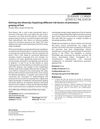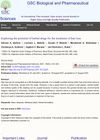 October 2024 in “Journal of the Pakistan Medical Association”
October 2024 in “Journal of the Pakistan Medical Association” Genetics, nutrition, lifestyle, and hormones affect early grey hair, but more research is needed.
7 citations,
July 2020 in “Dermatologic therapy” Premature graying of hair is linked to various health issues and can sometimes be reversed by treating underlying conditions.
 May 2023 in “International Journal of Home Science”
May 2023 in “International Journal of Home Science” PCOS is linked to metabolic issues and infertility, needing more research.
April 2013 in “The FASEB journal” Improving nutrition after gastrectomy can enhance quality of life and aid recovery.
 1 citations,
May 2009 in “Annales de Dermatologie et de Vénéréologie”
1 citations,
May 2009 in “Annales de Dermatologie et de Vénéréologie” Environmental factors like smoking, UV exposure, and poor diet contribute to hair loss and graying, and lifestyle changes can help manage it.
 24 citations,
January 2020 in “International Journal of Molecular Sciences”
24 citations,
January 2020 in “International Journal of Molecular Sciences” Some plants with flavonoids may help treat hair loss and promote hair growth.
 6 citations,
May 1993 in “Archives of Disease in Childhood”
6 citations,
May 1993 in “Archives of Disease in Childhood” Children's hair loss can be caused by many factors, including autoimmune diseases, emotional stress, genetics, and infections, with treatment and prognosis varying.
 1 citations,
May 2016 in “Current Opinion in Pediatrics”
1 citations,
May 2016 in “Current Opinion in Pediatrics” Children's hair loss can be caused by various factors and should be treated with appropriate, age-specific methods and psychological support.
 September 2024 in “South Eastern European Journal of Public Health”
September 2024 in “South Eastern European Journal of Public Health” Treatment improved PCOS symptoms and reduced BMI and certain immune factors.
 May 2017 in “InTech eBooks”
May 2017 in “InTech eBooks” Early treatment of children's hair loss, which can be caused by various factors, is important due to its emotional impact.
 9 citations,
April 2018 in “Journal of trace elements in medicine and biology”
9 citations,
April 2018 in “Journal of trace elements in medicine and biology” Hair analysis can show nutritional status and environmental exposure, with phosphorus being very stable in hair and differences found based on gender and conditions like depression and autism.
 August 2023 in “Revista Contemporânea”
August 2023 in “Revista Contemporânea” Early life factors, including a mother's health and environment, can affect the chances of developing polycystic ovary syndrome later in life.
 336 citations,
August 2015 in “European Journal of Epidemiology”
336 citations,
August 2015 in “European Journal of Epidemiology” The Rotterdam Study found risk factors for elderly diseases, links between lifestyle and genetics with health conditions, and aimed to explore new areas like DNA methylation and sensory input effects on brain function.
 4 citations,
November 2009 in “Medical Clinics of North America”
4 citations,
November 2009 in “Medical Clinics of North America” Stress, nutritional issues, and chronic diseases can cause hair loss, and nail changes may signal internal diseases; treatment focuses on the underlying cause.
 29 citations,
June 2005 in “Journal of Zoo and Wildlife Medicine”
29 citations,
June 2005 in “Journal of Zoo and Wildlife Medicine” Most hair loss in captive rhesus macaques is likely due to environmental and behavioral factors.
July 2021 in “Journal of medical pharmaceutical and allied sciences” Amenorrhea, or missing periods, is caused by various factors and is treated based on the specific cause.
 44 citations,
November 1998 in “Australasian Journal of Dermatology”
44 citations,
November 1998 in “Australasian Journal of Dermatology” Accurate diagnosis is key for treating different kinds of hair loss, and immune response variations may affect the condition and treatment results.
 4 citations,
July 2019 in “Children (Basel)”
4 citations,
July 2019 in “Children (Basel)” The review concludes that more research is needed to better improve the health outcomes for people with Polycystic Ovarian Syndrome.
 4 citations,
August 1978 in “PubMed”
4 citations,
August 1978 in “PubMed” Many women's hair loss is due to health issues, medication, nutrition, or stress.

Different genes cause Female Pattern Hair Loss compared to male hair loss, and treatments vary, but more research is needed to understand it fully.
January 2022 in “International journal of advanced engineering research and sciences” Hair extensions can improve self-esteem but may cause hair loss if used improperly.
 7 citations,
December 2013 in “The Journal of Dermatology”
7 citations,
December 2013 in “The Journal of Dermatology” A woman's hair turned gray and fell out after starting a cancer drug called imatinib mesylate.
 January 2014 in “Cosmoderma”
January 2014 in “Cosmoderma” The document concludes that personalized treatment plans for hair loss in Asian men are necessary and more research is needed to develop effective guidelines.
6 citations,
January 2020 in “Springer eBooks” Good nutrition is essential for healthy hair.
 4 citations,
August 2021 in “GSC biological and pharmaceutical sciences”
4 citations,
August 2021 in “GSC biological and pharmaceutical sciences” Some plants might help prevent or treat hair loss.
 March 2023 in “International Journal of Biomedicine”
March 2023 in “International Journal of Biomedicine” Hair loss from Telogen Effluvium can be managed by treating the underlying cause and may improve with treatments like minoxidil.
 July 2018 in “International journal of clinical & experimental dermatology”
July 2018 in “International journal of clinical & experimental dermatology” Eat a balanced diet for healthy hair; only use supplements if you have a proven nutrient deficiency.
August 2018 in “Ayurline: IJ-RIM” Diet and lifestyle changes can help manage hair loss in alopecia.
 July 2012 in “Hair transplant forum international”
July 2012 in “Hair transplant forum international” Lifestyle choices like stress, smoking, heavy drinking, sun exposure, and chemical hair treatments might speed up hair loss in people with androgenetic alopecia.
 69 citations,
February 2002 in “International Journal of Cosmetic Science”
69 citations,
February 2002 in “International Journal of Cosmetic Science” Some hair loss can be treated, especially in women due to nutrition, but some types remain untreatable.
























